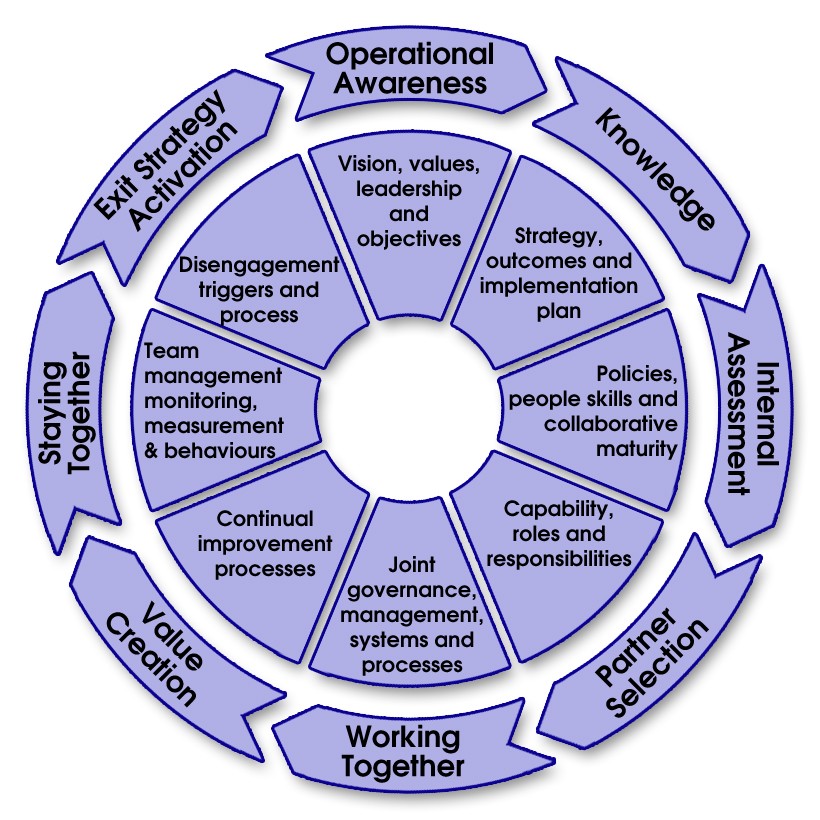
As Business Arrangements Become More Complex, Achieving Optimum Sustainable Performance Requires Flexibility, Adaptivity, and Increased Collaboration.
It is no secret that the many complex public–private and public-public business arrangements fall short of meeting stakeholder expectations. The single leading cause of failure is that complex, long term agreements are structured and managed as static transactions or deals, and therefore do not adapt well to change and evolution. By positioning the relationship among stakeholders at the heart of delivery, oversight and performance management, business arrangements are structured and managed as collaborative and adaptive system that drive change and achieve improved outcomes with lower risk.
This Executive program will equip attendees with the skills and know-how to oversee the planning, sourcing, establishment, and management of relationships that will deliver exceptional performance. The program will provide a high level guide to implementing and operationalizing the ISO 44001 standard for collaborative business relationships and building the required capacity and skills necessary to enable change and create a culture of collaboration and trust.
THE RELATIONAL MODEL – AN ISO STANDARD
 The Relational model of Management supports the development and management of an adaptive business relationship among partners, with whom collaboration and ongoing alignment is critical to achieving overarching common objectives. The Framework operationalizes ISO 44001, which was approved in Dec 2016 and published in early 2017, from the both perspectives of the internal policy and governance readiness to collaborate and in terms of establishing specific relationship management plans with strategic partners.
The Relational model of Management supports the development and management of an adaptive business relationship among partners, with whom collaboration and ongoing alignment is critical to achieving overarching common objectives. The Framework operationalizes ISO 44001, which was approved in Dec 2016 and published in early 2017, from the both perspectives of the internal policy and governance readiness to collaborate and in terms of establishing specific relationship management plans with strategic partners.
WHO SHOULD ATTEND
This training program is recommended for public and private sector executives, relationship managers, and managers involved in the planning, sourcing, negotiations or management of complex business arrangements.
LEARNING OBJECTIVES
- Gain insight into the issues and challenges associated with managing complex business relationships;
- Understand the difference between individual relationships and relationship management as a system for outcome improvement;
- Learn about the definitive framework for best practices relationship management – the ISO 44001 international standard;
- Learn about Relationship Charters, and ISO 44001 relationship management plans, Joint Governance and, collaborative competencies development systems;
- Learn about the necessary tools to establish and operationalize relationships management frameworks in diverse stakeholder environments;
- Learn how to objectively assess relationship fit and partner capability, in relation to desired project/program outcomes, in the planning, sourcing, negotiations or management of complex business arrangements.
- Learn how to effectively construct and apply relational contract principles – how to plan, source and manage adaptive relationships that provide an ongoing opportunity to improve outcomes within a public sector procurement regime;
- Learn how to form and activate high performing joint teams within a mutually shared environment of trust and collaboration;
- Gain an understanding of the road map for facilitating collaborative engagements and for operationalizing ISO 44001 relationship management plans.
- Develop the necessary capability to manage culture change and the transition of complex business arrangements.
Program Takeaways
Participants will develop a “total system” understanding of adaptive business relationships and ISO 44001 Implementation with emphasis on change management and transitioning organizational cultures from an adversarial mindset to a collaborative, insight-based model of management.
AGENDA
Relationship Management Overview
- A Macro level view of Relationship Management and ISO 44001
- Complex Arrangements Overview, Challenges and Opportunities
Relationship Management Framework Reference Model
- An Introduction to collaborative, Relationship-Based Management Frameworks
- Relationship Charter – Foundations of a Collaborative Business Relationship
Implementation – Relationship Management Plans
- ISO 44001 – Overview and Guidance
- Developing & Operationalizing the Relationship Charter and Management Plan
Implementation – Managing Relationships
- Performance Management
- Integrated Risk and Enablement Management
- Information Sharing
- Relationship Administration
Relational Contracting Management
- Procurement of Strategic Relationships in the Public Sector
- Strategic Analysis & Partner Selection Tools
Collaborative Competencies & Change Management
- Interest-Based Problem Solving Approach
- Creating a Culture of Collaboration and Trust
- Managing the Change
LEAD FACILITATOR

Andy Akrouche
FACILITATORS

Monty Mukerji

Jon Hansen
